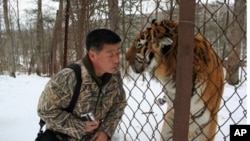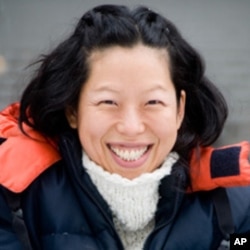Min Sook Lee is an award-winning filmmaker whose immigration from war-torn Korea to Canada when she was three years old left her with little knowledge of the land she left behind. That void turned into the driving force behind Tiger Spirit, a documentary about the emotional scars of war, inter-Korean family reunions and Lee's own personal journey to heal her fractured identity.
Listen to the interview:
Lee says she grew up with a kind of “schizophrenic" relationship to the country of her birth, a common experience for immigrant children. She says she was encouraged to blend into her new white community, yet constantly reminded of the immigrant’s responsibility to succeed.
“Once I started trying to understand what is Korean and investigating what that means, I realized that my own personal sense of being broken was mirrored or paralleled by my own country’s broken history,” Lee tells VOA. “Korea is broken as a nation.
Divided literally, but in many ways culturally and socially. [There are] so many psychological wounds that have not been addressed by Koreans on either side of the border.”
A few years ago, Lee returned to Korea to make a film about one man’s quest to prove that tigers still live in the Demilitarized Zone between North and South Korea. But her focus shifted when Pyongyang and Seoul announced family reunions for relatives divided by the Korean War of the 1950s.
Manufactured healing
The reunions, now on hold as North and South Korea struggle to find common political ground, are broadcast on national television, captivating audiences with dramatic images of sobbing elderly men and women embracing long-lost relatives. But Lee says the connections she witnessed in three one-hour meetings were superficial - the conversations stilted by memory loss and fear that their words were being recorded by North Korean agents.
“The story of family reunions to me is really a story of government manipulation of people’s lives. It makes me angry and it makes me see how so often people are used as pawns for public policy on either side of the border,” she says. “Most people I talked to who participated in them, afterwards they spoke about deep, deep disappointment and depression and anxiety and stress for the time following."
Reunification
Lee says most Koreans who fled the north assumed that reunification would happen within months.
“No one thought that the divide would be forever. They didn’t take the time to say goodbye that would be meaningful in any way,” she says. “So the break was so raw that I think many people who are alive today who experienced the separation, it’s a wound that’s never healed.”
Lee says she expected most South Koreans would want to reunite with North Korea. But she admits that was a romanticized notion shaped by her expatriate experience.
“When I visited Korea, so many of the younger South Koreans expressed they weren’t interested in reunification,” she recalls. “They thought that South Korea couldn’t afford it, couldn’t sustain the cost and burden. And they cited the German experience and, to them, that was a disaster.”
Familiar strangers
When North Korean defectors arrive in the South, Lee says they are socially and psychologically alienated from the culture. They have no idea how capitalism works, or how to use a bank machine.
“South Koreans talk about North Koreans as if they’ve come from a time machine. They wear different clothes. They speak a Korean dialect. They use Korean words South Koreans haven’t heard in 60 years,” she says.
Despite the psychological and political divide, Lee believes reunification will happen in her lifetime. She points to Pyongyang’s economic troubles, Seoul’s economic success, and the new generation of North Koreans who are divorced from their country’s establishment.
“When I spoke to North Korean defectors, more and more North Koreans are growing more disenchanted,” she says. “And I think the support for North Korean state is becoming more diminished in a real sense.”
Family ties
While filming Tiger Spirit, Lee became pregnant with her first child. Her own mother died while she was a girl, leaving Lee to prepare for a role completely foreign to her. And while tramping through Korea, first in search of tigers and later the Korean spirit, Lee found something unexpected: a sense of family.
“As soon as [my daughter] was born, suddenly the meaning of the family separation, it cleaved my soul,” Lee says. “I realized within seconds of her being born, that if anyone had tried to take her away from me, if I missed her, there is a death that happens. And I finally understood in a very deep, empathic, soulful way in a level I hadn’t prior to my daughter’s birth.”
Lee recently completed a documentary about medics in the Korean War called The Real MASH for History Television Canada and is now tackling a new challenge: comedy. She is the brainchild behind She's The Mayor, a new sitcom about Toronto city politics slated to debut on Canada's VisionTV this year.












